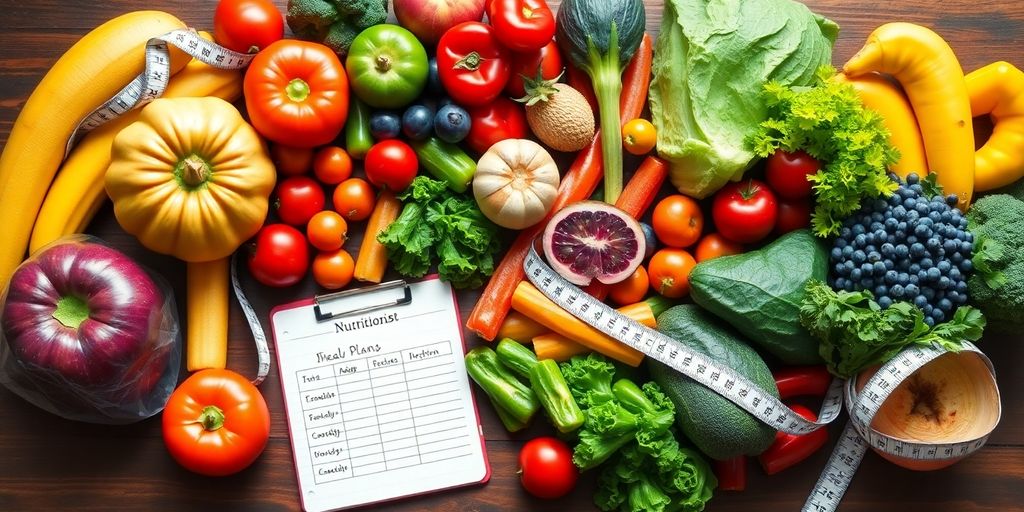If you’re a nutritionist trying to make your mark online, understanding SEO is key. It’s not just about being found; it’s about being found by the right people. With the right approach to SEO, you can boost your visibility, attract more clients, and grow your practice. But where do you start? This guide will walk you through the essentials of SEO tailored specifically for nutritionists.
Key Takeaways
- SEO helps nutritionists reach more clients online by improving website visibility.
- Effective content strategies involve finding the right keywords and creating engaging material.
- Optimizing your website includes both technical aspects and enhancing user experience.
- Local SEO is crucial for nutritionists to connect with clients in their area.
- Building authority through backlinks can significantly boost your site’s search ranking.
Understanding SEO Fundamentals for Nutritionists
Defining SEO and Its Importance
Search Engine Optimization, or SEO, is all about making your website more visible in search engine results. Think of it as the digital equivalent of putting your nutrition practice on a busy street corner where everyone can see it. SEO is crucial for nutritionists because it helps connect you with people actively searching for your services. Without it, even the best nutrition advice might go unnoticed online. By optimizing your website, you increase the chances of reaching potential clients who are looking for nutrition guidance.
Key Components of SEO
SEO isn’t just one thing—it’s a mix of several important parts:
- Content: Creating valuable and relevant content that answers the questions your audience is asking.
- Keywords: Using specific words and phrases that people type into search engines when looking for nutrition advice.
- Technical SEO: Ensuring your website runs smoothly, loads quickly, and is easy to navigate.
These components work together to improve your site’s ranking in search results, making it easier for clients to find you.
How SEO Works in Search Engines
Search engines like Google use complex algorithms to decide which websites show up first in search results. They consider factors like keyword usage, site structure, and how often your content is updated. By understanding and implementing SEO strategies, you can help search engines recognize the value of your site, boosting your visibility. It’s like speaking the same language as the search engines, so they know exactly where to place you in the search results.
Creating Effective Content Strategies

Identifying Target Keywords
First things first: you need to know what people are searching for. Identifying target keywords is like figuring out what your audience is really interested in. Start by brainstorming topics related to nutrition that you think your audience might be curious about. Then, use tools like Google Keyword Planner or Ubersuggest to find out what keywords are popular. Look for a mix of high-volume and low-competition keywords. This way, you can rank better without competing against massive sites.
Crafting High-Quality Content
Once you have your keywords, it’s time to create content that stands out. High-quality content isn’t just well-written; it’s also useful and engaging. Make sure your content answers questions thoroughly so readers don’t need to look elsewhere. Organize your content with clear headings and bullet points to make it easy to read. Don’t shy away from using different formats like videos or infographics to keep things interesting. Remember, the goal is to create something better than what’s already out there.
Think of your content as a conversation with your audience. You’re not just providing information; you’re building a relationship.
Utilizing Different Content Formats
Let’s face it, not everyone loves reading long articles. That’s why it’s smart to mix it up with different content formats. Videos, podcasts, and infographics can be great ways to reach people who prefer visual or auditory content. Consider creating a short video series on nutrition tips or a podcast about healthy eating habits. This not only keeps your content fresh but also helps you reach a wider audience. Plus, using varied formats can enhance your SEO strategy by engaging users across different platforms.
Optimizing Your Website for Search Engines

On-Page SEO Techniques
Getting your on-page SEO right is like setting the foundation for a solid house—it’s crucial. Start by ensuring your main keywords appear naturally in the title, headings, and meta descriptions. But remember, avoid keyword stuffing; it’s a trap that can harm your rankings. Instead, sprinkle synonyms and related phrases throughout your content. Also, don’t forget about alt text for images; it helps search engines understand your visuals.
Improving User Experience
User experience isn’t just about looking good; it’s about feeling good too. A site that loads fast and works smoothly on any device is a win. Responsive design is key here. If your site isn’t mobile-friendly, you’re likely losing visitors and ranking points. People are more likely to stick around and explore a site that’s easy to navigate and quick to load.
Technical SEO Best Practices
Technical SEO might sound intimidating, but it boils down to making sure search engines can easily access and understand your site. This includes optimizing your site’s speed, ensuring your URLs are clean and descriptive, and using a sitemap. Crawl errors? Fix them pronto. And always keep an eye on your website’s health with regular audits to catch any issues before they become big problems.
"A well-optimized website is like a well-oiled machine—it runs smoothly and efficiently, delivering the best experience for users and search engines alike."
By focusing on these areas, you can create a website that not only attracts visitors but also keeps them coming back. It’s all about the balance between pleasing your audience and the search engines. So, get these basics right, and you’ll be on the path to SEO success.
Leveraging Local SEO for Nutrition Practices
Importance of Local SEO
Local SEO is like a spotlight for nutrition practices, making sure your business shines in local search results. When folks around your area search for "nutritionists near me," you want your practice to pop up. This visibility is vital because it connects you with local clients who are actively looking for your services. Local SEO helps you compete against bigger, national brands by focusing on your community.
Strategies for Local Optimization
To get started with local SEO, focus on these steps:
- Google My Business: Claim and optimize your Google My Business listing. Make sure your business name, address, and phone number are correct.
- Local Keywords: Use localized keywords in your website content. Think about what people in your area might search for.
- Customer Reviews: Encourage happy clients to leave positive reviews online. These reviews can boost your rankings and attract new clients.
Tracking Local SEO Performance
Keep an eye on your local SEO efforts by tracking these metrics:
- Local Search Rankings: Check where your business appears in local search results.
- Website Traffic: Monitor the amount of traffic coming from local searches.
- Customer Engagement: Look at how often local visitors engage with your site, like filling out contact forms or calling your practice.
Local SEO isn’t just about getting found—it’s about building trust with your community. By showing up in local searches, you’re telling potential clients that you’re ready and available to help them with their nutrition needs.
Building Authority Through Link Building
Understanding Backlinks
Backlinks are like votes of confidence from other sites. They tell search engines that your content is worth checking out. But not all backlinks are created equal. Focus on getting links from reputable sites. This shows search engines that your site is trustworthy and relevant. Avoid links from spammy sites as they can harm your ranking.
Strategies for Acquiring Links
Getting the right backlinks involves strategy. Here are a few ways to do it:
- Guest Blogging: Write articles for other sites and include a link back to your site. It’s a win-win.
- Local SEO Efforts: Discover effective strategies for acquiring high-quality local backlinks tailored for service providers and retailers.
- Collaborate with influencers or industry experts. Their endorsement can drive traffic and boost your authority.
Measuring Link Building Success
Tracking your progress is key. Use tools to monitor which sites are linking to you and how it affects your traffic. Keep an eye on metrics like referral traffic and search rankings. Adjust your strategies based on what’s working and what’s not.
Building authority through link building isn’t just about quantity—it’s about quality. Focus on creating meaningful connections with reputable sites to boost your SEO.
Utilizing Social Media for SEO Benefits
Integrating Social Media with SEO
Social media isn’t just about sharing cat videos or memes. For nutritionists, it’s a powerful tool to boost your SEO game. By actively engaging on platforms like Instagram and Facebook, you can demonstrate your expertise and connect with your audience in a meaningful way. When you share content that resonates with your followers, it can lead to more shares, likes, and comments, which in turn signals to search engines that your content is engaging and relevant. This can positively impact your search rankings.
Engaging Your Audience Online
Keeping your audience engaged is key. Try asking questions, hosting live Q&A sessions, or sharing behind-the-scenes content of your nutrition practice. These activities not only build community but also encourage interaction, which can lead to more visibility online. Here are some ways to keep your audience hooked:
- Post regularly and at optimal times
- Use polls and interactive content
- Share user-generated content or testimonials
Tracking Social Media Impact on SEO
To understand how your social media efforts are paying off, you’ll need to track their impact on your SEO. Use tools like Google Analytics to see if there’s a spike in traffic when you post on social media. Look at metrics such as referral traffic, engagement rates, and conversion rates. Analyzing these numbers will help you tweak your strategy to better align with your goals.
Social media and SEO are like peanut butter and jelly—they work better together. By integrating these strategies, you can create a more cohesive online presence that draws in more clients and builds your brand.
Monitoring and Analyzing SEO Performance
Key Metrics to Track
Keeping an eye on SEO performance means knowing what to measure. Key performance indicators (KPIs) are essential for evaluating how well your strategies are working. Here are a few to focus on:
- Organic Traffic: The number of visitors coming to your site through search engine results.
- Bounce Rate: The percentage of visitors who leave after viewing only one page.
- Conversion Rate: How many visitors take a desired action, like signing up for a newsletter.
Tracking these metrics helps you understand your site’s strengths and weaknesses, providing a clear picture of what’s working and what needs improvement.
Tools for SEO Analysis
To get a grip on these metrics, you’ll need the right tools. Google Analytics and Google Search Console are must-haves. They offer insights into traffic sources, user behavior, and more. Other tools like SEMrush or Ahrefs can help you dive deeper into keyword performance and backlinks. Don’t forget about using key performance indicators to align with your business goals.
Adjusting Strategies Based on Data
Once you’ve gathered your data, it’s time to act on it. If your bounce rate is high, consider improving your site’s user experience or content relevance. Low conversion rates might mean you need to tweak your calls-to-action or landing pages. Regularly reviewing your metrics and making informed changes ensures your SEO efforts are always moving in the right direction.
"Analyzing your SEO performance isn’t just about numbers; it’s about understanding your audience and how they interact with your content. This insight is the key to refining your approach and achieving better results."
Wrapping It Up
So, there you have it. SEO might sound like a big, scary term, but it’s really just about making sure people can find you online. For nutritionists, it’s a game-changer. By using the right keywords and keeping your website user-friendly, you can reach more folks who need your expertise. It’s not just about getting clicks; it’s about connecting with people who are looking for help with their health. And let’s be real, who doesn’t want to help more people while growing their business? So, dive in, experiment a bit, and watch your online presence grow. It’s all about making those small tweaks that lead to big changes.
Frequently Asked Questions
What is SEO writing?
SEO writing is crafting online content to make it more visible in search engines. This helps your content show up in search results when people look for specific words or topics.
How can I promote my nutrition business?
You can promote your nutrition business by creating a professional website, using local SEO, and sharing valuable content. Also, engage on social media, attend local events, and build partnerships. Offer free workshops and gather client reviews to enhance your marketing.
How is SEO effective in marketing?
SEO becomes effective in marketing by focusing on the right keywords, creating quality content, and ensuring a good user experience. Building links from trusted sites and using local SEO also play a big role.
Who are nutritionists’ target audience?
Nutritionists often target people looking for diet help, those with health goals, athletes, individuals with medical conditions, and anyone wanting to improve their health through better eating.
How do I rank in Bing, Yahoo, and other search engines?
To rank in Bing, Yahoo, and other search engines, you need to optimize your site with the right keywords, create high-quality content, and ensure your site loads quickly and works well on mobile devices.
Why is SEO important for nutrition professionals?
SEO is important for nutrition professionals because it helps more people find your website, which can lead to more clients. It improves your online presence and shows you’re a trusted expert.






